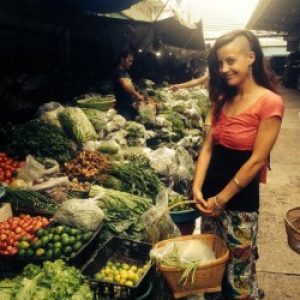
Food
Authentic Thai and Burmese food is delicious, easy to find, and not expensive. Street food is especially yum but can be a bit much for the newcomer’s stomach. (Or not, depends on you.) In Mae Sot there are several restaurants that specialise in Western food, including one called Casa Mia just around the corner from Ban Thai. They also have Thai and Burmese dishes on the menu, making it a good choice for group meals.
Be aware that dietary restrictions are not always catered for. Thai food is often cooked with fish sauce or tiny crabs in the boiling water, even for dishes that are otherwise vegetables. If you are vegetarian, there are things for you to eat especially at the Western restaurants. If you are vegan, less so, and more mistakes (special requests for “no egg” and so on often get forgotten). Gluten free folks will find lots of rice on the menu, including rice noodles. If you are raw foodist, be prepared to fend for yourself. The markets will be good to you but bring raw food snacks from home.
Some of the schools and venues treat us to meals after our performances. These are truly special times and the food varies from soupy curries with rice to deep fried vegetables and whole fish. Not always vegetarian-friendly. It is polite to eat heartily, but don’t take more than you can finish. The leftovers will be eaten by people at the school.
Accommodation
In Mae Sot, we stay at a guesthouse complex called Ban Thai. There are several buildings that offer shared or single accommodation, some with ensuite bathrooms. You may not have a choice about sharing your room, though you can probably choose your roommates(s). The rooms are clean and simple. There is a also common area with large tables, a kitchen (though we don’t have a lot of time to cook), and grassy space where we have morning meetings and rehearsals. We also have use of a large carport space we call the “glitter cave” where we keep our costumes and other supplies. At the guesthouse reception, there is a fridge with water, cold beverages, and yogurt for sale and also instant coffee and tea.
During the island fundraising portion of the trip on Koh Phangan we rent the shared dorms at Beam, where we were spoiled by the staff’s attentiveness and the delicious food.
Power

Electricity in Thailand is 220 volts, 50 cycles. Check your appliances before bringing them.
Plug sockets vary, but most are Type C and have two round holes. You may need an adapter. It is a good idea to buy or bring a powerboard/multiplug extension cable with surge protection. There are few power outages, but not all wiring is stable.
Money & Banking
Cash can be exchanged at the airport, at banks or money changers all around Thailand. Rates vary. Sometimes they can be very good, especially at the airport. Don’t bring Baht to Thailand, exchange your home currency when you arrive.
ATM withdrawals. There are ATMs in Mae Sot that accept international banking cards (Cirrus, Maestro, and Plus networks) and will give you decent exchange rates, but add on a 200 Baht fee per transaction. Be sure your accounts are on Plus, Cirrus or Maestro networks. The max withdrawal at most banks is 20,000 Baht. Note that some ATMs offer to convert the charge to your home currency: choose NO and save some hidden fees.
Credit cards are not widely accepted for payment, particularly in the local shops where you’ll buy daily needs and food. Credit card cash withdrawals from ATMs can be very costly.
Traveller’s cheques are basically not accepted anywhere – you will need to visit a bank to get them exchanged.
Banks in Mae Sot: SCB, Bangkok Bank, Kasikorn, CIMB Thai
Culture & Refugee Camps
Thailand, Myanmar and the Burmese hill tribes each have unique cultures. They are, on the whole, more conservative of dress than the West. We ask that even when not in costume you dress appropriately in clean clothes that cover your knees, breasts, belly and shoulders.
- Meals are shared, buffet style
- Do not take more food than you can finish
- Speak quietly and avoid argument or aggression
- Smile even when you are frustrated
- Bargain in the markets, but gently
- Do not point with hands or feet
- Do not face your feet towards the Buddha or King (even in a handstand)
There are over a quarter million Burmese in refugee camps on the Thai borders. The situation is changing after the 2014 Thai coup, but it is still sad and difficult for everyone. The camps are run by the military and supported by international NGOs. They can be quite challenging to get authorization to visit. If we arrange a visit, you will need to provide a copy of your passport, so it is important to submit it with your application to Spark.
Weather & Environment
It is hot (in the mid 30s and higher) and humid. Some mornings feel chilly enough for a fleece but by afternoon, it was sweltering. There are some bursts of rain. Mostly it is very dry and very hot.
Communication
E-mail & Internet
Our usual guesthouses and home base have WiFi, so you will be able to check e-mail and so on. However, bandwidth is not high so downloads and video conferences may not work well.
Phone
It is essential & required that you have a phone that works in Thailand. Keep it charged, topped up with credits, and on your person at all times. We will share phone numbers and also keep a printed phone list on display.
To Do Board
There is a paper list in one of the common areas for shopping lists and other tasks that need to be taken care of. If you need something, want help with a task, or have time to offer, be sure to note it on the board.
Health
Absolutely have traveler’s insurance. This will cover any emergencies that may arise and there is always at least one in the troupe. In 2015, there was blood poisoning from a centipede bite, and also a tooth infection that required surgery. You never know what will happen. Thai healthcare is affordable, but insurance is more affordable.
You will encounter some unsanitary conditions. There are places where there may not be running water, and we may be coming in contact with a lot of germ-carrying kids! So bring along whatever you need to stay healthy: electrolytes, vitamins, herbs, a basic first aid kit, travel pillow, ankle brace, wet wipes, hand sanitizer, bug repellent, etc. Keeping them in a belt pouch while working is a smart idea.
You will likely get sick to one degree or another. With a troupe of people in close proximity to each other and interacting with dozens of children, it may be inevitable. Even if you avoid viruses and other transmittable diseases, you are going to have a bout of diarrhea or some other digestive ailment from eating or drinking something funky. Our guts are not used to Thai and Burmese germs and digestive flora. You will adjust, but be prepared.
If you are not well, don’t perform or teach. Stay home and recover. It is disappointing to miss a day, but better to be healthy for the next one.
Stay hydrated. Drink more than you think you need to. Use electrolytes in your water on especially hot days. Dehydration leads to a weakened immune system, poor performance in physical tasks and a really cranky attitude. Bring your own water bottle and mark it with your name.
If you have first aid or medical training, please let us know.
If you have a physical or mental medical condition or health issue of any sort, disclosure before arriving is required. We will respect your confidence and want to be able to support you if necessary.
Mental Well-being
The circus environment is fun most of the time, but can be stressful to the mind and spirit.
We quickly become a family, loving each other to pieces but also fighting sometimes. Not everyone gets along every single minute of each day. And sometimes there may be someone in the circus you just can’t connect with very well, ever. On the opposite end of the scale, you may fall in love with a fellow performer. Emotions run high in both directions in the circus.
Illness, hormonal cycles, jetlag, homesickness, personality quirks and more all impact our ability to interrelate. Whether your feelings are positive or negative, try to be aware of yourself and kind to one another. Professional courtesy goes a long way to smoothing ruffled feathers.
It can be very exhausting and emotional to be working with street kids, orphans, refugees, and traumatized children in harsh environments. It is also exhilarating, because they are so happy, responsive and excited! It is an emotional and physical roller coaster for most. It’s a bonding experience for you and the people you work with.
It is essential to find time and space for yourself to recharge in the ways you need to. Jex, a Sparkle in 2013 and a veteran of festival organizations, suggests eating alone for one meal every day. Some people need to nap in between shows or get a certain amount of sleep at night. Others want to engage closely with small groups of friends. Some feel most refreshed if they spend spare time training or working on new acts. It is up to you to accommodate yourself as best you can. For some Sparkles, group activity is energising. For others it is draining. Find your balance. Be aware of other people’s boundaries and know how to signal yours in a gentle way.
Above all, be compassionate and remember that we are all in this together to create happiness for people outside our troupe.
Safety & Security
Though the border is unstable, we are generally totally safe in the places we go. You will NOT be in danger. Even in the refugee camps things are reasonably safe.
Theft
This is not usually a big concern, but everyone will be responsible for their own belongings. BE AWARE. We usually will have some place to lock away valuables when needed. We have had some thefts in previous years; always of cash or bags left unattended in busy areas or on trains. If you pay attention to your bags, purses and expensive gadgets, you should be fine. We often have several computers, cameras, sound systems etc, with no problems so far.
More often than theft, people have forgotten and lost belongings. The work we do is busy and chaotic, and you will often be tired and distracted. It is best to stay organized to avoid losing your property.


